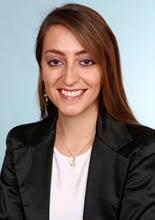DA alumna Maria Jose Alvear Larenas on her career since graduating from MAIS 20 in 2017
 I was fortunate enough to have been working for the UN by the time I graduated from university; since then, I knew I wanted to pursue a career in international cooperation. After three years working in project management and seeing how the UN System articulates its work with civil society organizations and national institutions, I wanted to broaden my understanding of International Affairs with a master’s degree. Of the many postgraduate programs, the Master of Advanced International Studies of the Diplomatische Akademie Wien was my first choice from the start, and I still remember how thrilled I felt when I received Genny’s email confirming my admission to the programme.
I was fortunate enough to have been working for the UN by the time I graduated from university; since then, I knew I wanted to pursue a career in international cooperation. After three years working in project management and seeing how the UN System articulates its work with civil society organizations and national institutions, I wanted to broaden my understanding of International Affairs with a master’s degree. Of the many postgraduate programs, the Master of Advanced International Studies of the Diplomatische Akademie Wien was my first choice from the start, and I still remember how thrilled I felt when I received Genny’s email confirming my admission to the programme.
I have great memories of the DA, and my time there was unforgettable. I made lifelong friends with whom I’m still in touch today, and, of course, one can never forget the many exhilarating activities organized. The fantastic DA Ball; Committees and Societies’ events; study trips; parties; study groups; birthday celebrations; among others. What I liked the most was the DA’s international student body, which provided the opportunity to exchange outlooks with individuals from all over the world, as well as the DA’s broad array of lectures, courses, and seminars on world affairs from which to choose.
After graduating from the DA, I started working for the Ecuadorian country office of HIAS, an international NGO that provides humanitarian assistance to refugees and migrants, a completely different field for me. My previous working experience at the UN focused on climate change and the management of natural resources.
Working in a humanitarian setting requires an understanding of several fields to assist vulnerable populations with basic needs coverage and promote their local integration. These include international and national law, human rights, psychology, gender analysis, migration, international protection, and socioeconomic integration, to name a few. The MAIS programme’s multidisciplinarity definitely helped me analyse all these fields together, allowing me to recognize the specific needs and risks that refugees and migrants face. This, in turn, enabled me to contribute ideas to the team at HIAS on how best to design relevant projects that needed to be implemented.
Humanitarian aid never gets boring! There is something new to learn every day, and when an emergency hits, like the current health crisis, you and your colleagues have to act fast to come up with alternatives to adapt to the situation at hand and continue to serve those in need. When I first joined HIAS, I started as a program analyst, then held the position of Venezuela Situation Specialist, given the significant migration flows coming into Ecuador from this country. Now, I hold the MEAL (Monitoring, Evaluation, Accountability and Learning) Position, which supports and provides orientation on these pillars, which are becoming ever more important to donors and partners. What has been most exciting to me in this position is designing, implementing, and systematizing post-distribution monitoring of cash and voucher assistance. I look forward to continuing working for the benefit of vulnerable populations and enhancing my international cooperation project management abilities.
[June 2021]